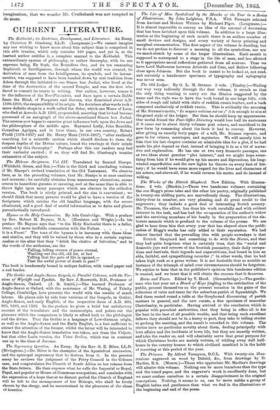£ UR RENT LITERATURE.
The Kabbalah ; its Doctrines, Development, and Literature. An Essay, by Christian D. Ginsburg, LL.D. (Longmans.)—We cannot imagine any one wishing to know more about this subject than is comprised in this able treatise, which only contains 160 pages, and yet is, as the learned author entitles it, a complete manual to the Kabbalab. This extraordinary system of philosophy, or rather theosophy, with its one supreme being, En Soph, the Boundless One, and its ten emanating Sephiroth or Intelligences, through whom the world was created, its derivation of men from the Intelligences, its symbols, and its herme- neutics, was supposed to have been handed down by oral tradition from Adam through the initiated to one Simon ben Jochai, who lived at the time of the destruction of the second Temple, and was the first who dared to commit its tenets to writing. Our author, however, traces it to the influence of the Neo-Platonists, and fixes upon a certain Rabbi Isaac the Blind, of Posqniers and Gerona, who flourished about A.D.
1190-1210, the responsibility of its origin. Its doctrines afterwards took a
more definite shape in a work called the Sohar, which one Moses of Leon. who died at Arevolo A.D. 1305, propounded, asserting that he had become possessed of an autograph of the above-mentioned Simon ben Jochai. The system now began to exercise groat influence both upon the Jews and the philosophers of the middle ages. Raymond Lolly, John Reuchlie, Cornelius Agrippa, and in later times, in our own country, Robert Fludd (1574-1637) and Dr. Henry More (1614-1687), "after restlessly searching for a scientific system which should disclose to them the deepest depths of the Divine nature, found the cravings of their minds satisfied by this theosophy." Perhaps after this our readers may feel their curiosity excited ; if so, they will find Dr. Ginsburg's treatise exhaustive of the subject.






























 Previous page
Previous page